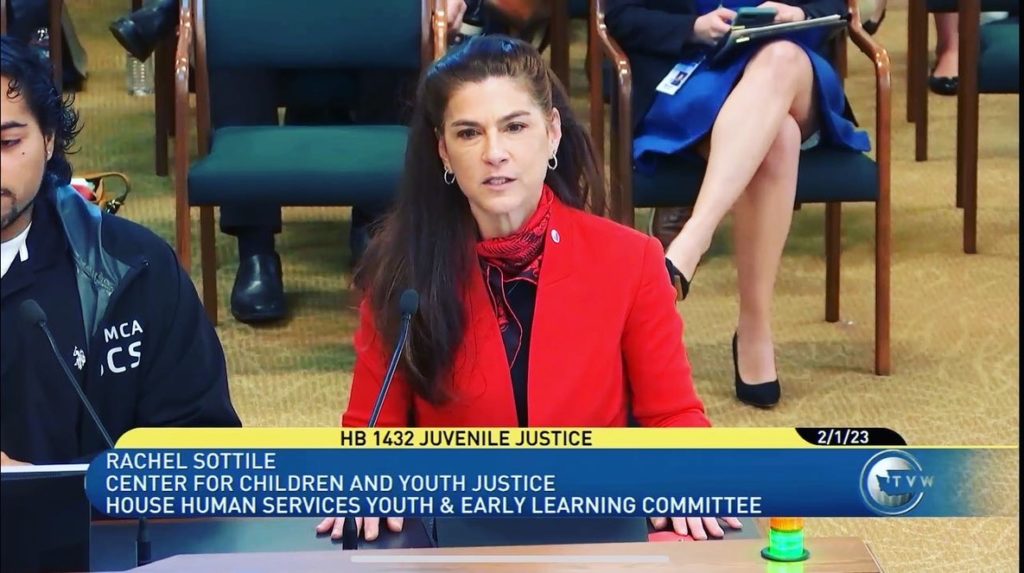“Court fines and fees criminalize poverty. They have a disparate, inequitable effect on communities of color without improving public safety, and they have for decades.”
Chief Justice Steven González, Washington State Supreme Court
CCYJ & Stand for Children Washington led off the 2023 Legislative Session calling for the full elimination of all monetary sanctions imposed upon youth – and – for victims to receive monetary reparation. Our work continues in 2024, as outlawed court fines and fees continue to harm Washingtonians.
CCYJ, joining our coalition of nearly 20 partner organizations at the Debt Free Youth Justice-WA coalition, as well as people directly impacted, is calling for the elimination of youth Fines, Fees & Restitution, and for victims to receive financial reparations.
Under state law, juvenile court debt from administrative fees and fines is uncollectible and county clerks are prohibited from accepting payments. Unfortunately, more than $40 million across approximately 143,000 juvenile cases is still on the books. Courts can’t collect it, but this debt impacts credit ratings and may be owned by collection agencies, which has long-term consequences for tens of thousands of individuals and families. Many of these Washingtonians have been out of the juvenile justice system for decades, yet this court debt follows them.
Petitioning the court to waive old debt is costly and time-consuming; only an estimated 3% of eligible individuals will get relief via individual motion. Furthermore, counties may be exposing themselves to liability by maintaining uncollectible debt – if a clerk, even unknowingly, accepts payment for an old juvenile court fee, they would be breaking the law.
Our work continued in early 2024, mobilizing with our partners from the Debt Free Youth Justice Washington coalition, to forward our efforts through SB5974. Over the last decade, the Washington legislature has recognized that charging fines and fees – which used to require youth and their families to pay for prosecution, community service, diversion programs, and many other costs – is harmful. Last year, they took away juvenile courts’ power to impose fines and fees. But people still owe money for fines and fees imposed before July 2023. It’s illegal for courts to accept payment on this debt, but, nonsensically, courts will not write it off as the legislation originally intended. This is causing thousands of people real harm. Uncollectible debt can be a barrier to record sealing, shows up on background checks, impacts credit, and can still lead to harassing calls from debt collectors. This process should also be automatic– when a similar type of relief was not automatic, it was estimated that less than 5% of eligible people were able to get it. Fortunately, legislation passed this session that automatically cleared juvenile court fine and fee debt: Senate Bill (SB) 5974, sponsored by Senator Noel Frame, and HB 2251 sponsored by Representative Julio Cortes. We have been working on this issue for several years now as members of the Debt Free Youth Justice Washington coalition. Our coalition believes that youth deserve to succeed after involvement in the juvenile legal system, which means not leaving them with debt and collateral consequences hanging over their heads.
Bureaucratic Barriers
- Washington’s courts are decentralized so each court is handling LFO relief differently.
- Court rules require a motion in each individual case and there is no designated party to file these motions.
- Few courts are complying with 2022’s HB 2050 which required courts to waive “parent pay” debt for county-level juvenile detention fees.
- Most counties have not even developed a standardized form or process for individuals to seek relief.
Local Innovations
The Skagit County Clerk’s office developed an innovative solution in partnership with their civil prosecuting attorney. They file an ex parte motion, the judge grants it, and they zero out the uncollectible debt. Individuals and prosecutors are not required to appear.
Scaling statewide
The state legislature should direct courts to develop an ex parte process, similar to Skagit County’s, to eliminate uncollectible juvenile court debt and to satisfy any open judgements associated with the debt. Washingtonians who have long ago left the justice system should not bear lifelong financial consequences of youthful mistakes.


